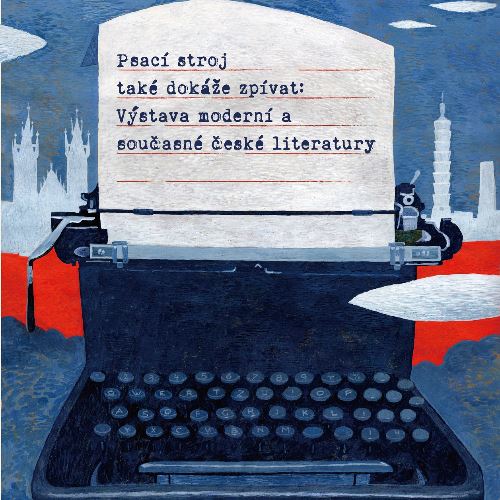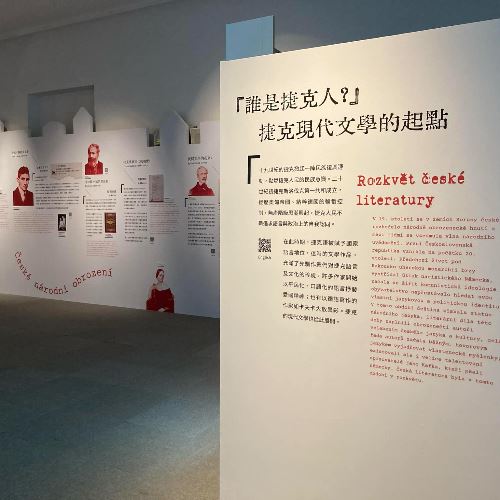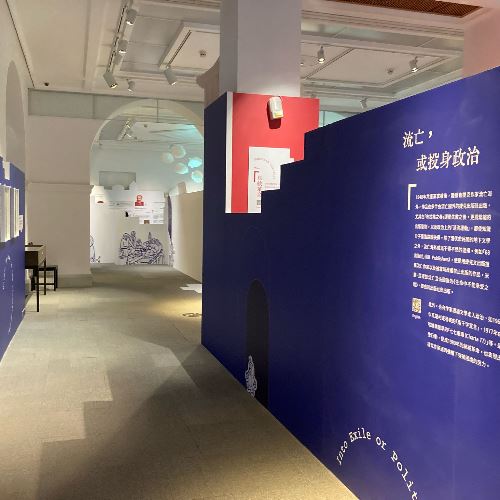Clean Surface, Noisy Underground

The return to communist authoritarianism in Czechoslovakia during the Normalizace period immediately following the country’s brief-lived 1968 “Prague Spring” led directly to the flowering of samizdat (dissident) literature and publishing. Although authors and other thought leaders appeared to have returned to the straight and narrow and dissident voices to have been silenced, beneath this deceptively “clean” surface were secretly produced and shared works filled with noisy commentaries, discussions and debates on issues of the day. These underground publications were generally hand-typed by their authors and published and distributed illicitly.
While author Bohumil Hrabal self-effacingly denounced his earlier infringements of party doctrine to earn government approval to publish openly, Ivan Klíma relied exclusively on underground and secret publishing networks to distribute his works. The opposite strategies used by these two authors authentically capture the face of thought control and dissident literature under communist rule in Czechoslovakia.
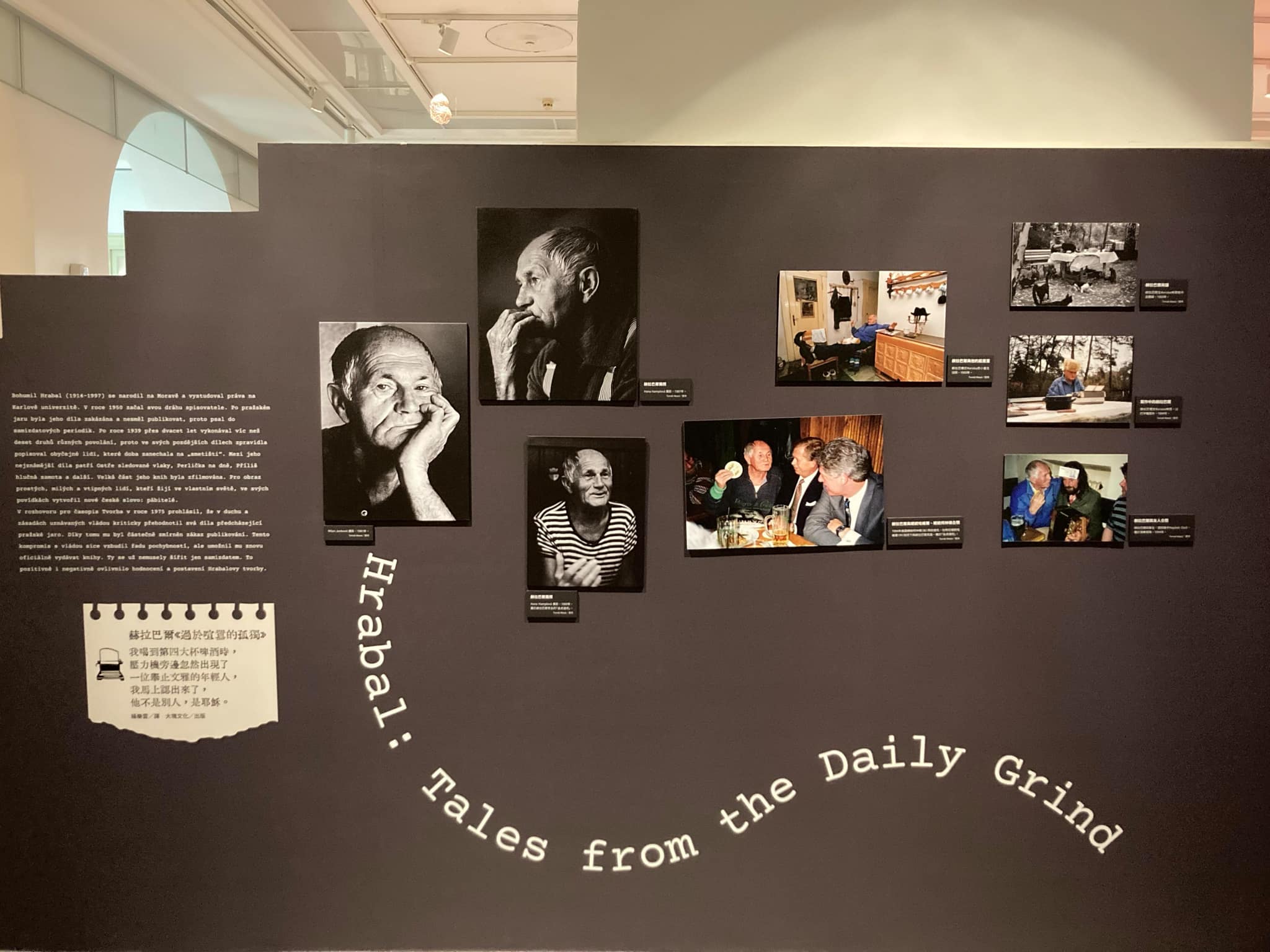
Hrabal: Tales from the Daily Grind
Bohumil Hrabal (1914-1997) was born in Moravia, graduated with a degree in Law from Charles-Ferdinand University in Prague, and didn’t begin his literary career until 1950. His writings, banned in the crackdown after Prague Spring, were distributed for a time through the Czech underground press. Between 1939 and 1950, Hrabal held a dozen or so different jobs, inspiring the focus he would later place in his works on the “everyperson” and on those chewed up and tossed aside by society. Several of his standout works, some of which have since been adapted into movies, include Ostře Sledované Vlaky (Closely Watched Trains), Perlička na Dně (Pearls of the Deep), and Příliš Hlučná Samota (Too Loud a Solitude). His writings inspired the advent of the Czech term pábitelé, meaning a pleasant, easygoing person content with the happiness of everyday life.
A 1975 interview with Tvorba Magazine in which Hrabal professed his alignment with official ideals and principles and criticized his previous mindset led to the partial easing of government restrictions on his works. Although eliciting questions from his peers and readers, his self-effacing statements allowed him to publish in the open rather than through underground channels. His actions in this regard has muddled his literary legacy.
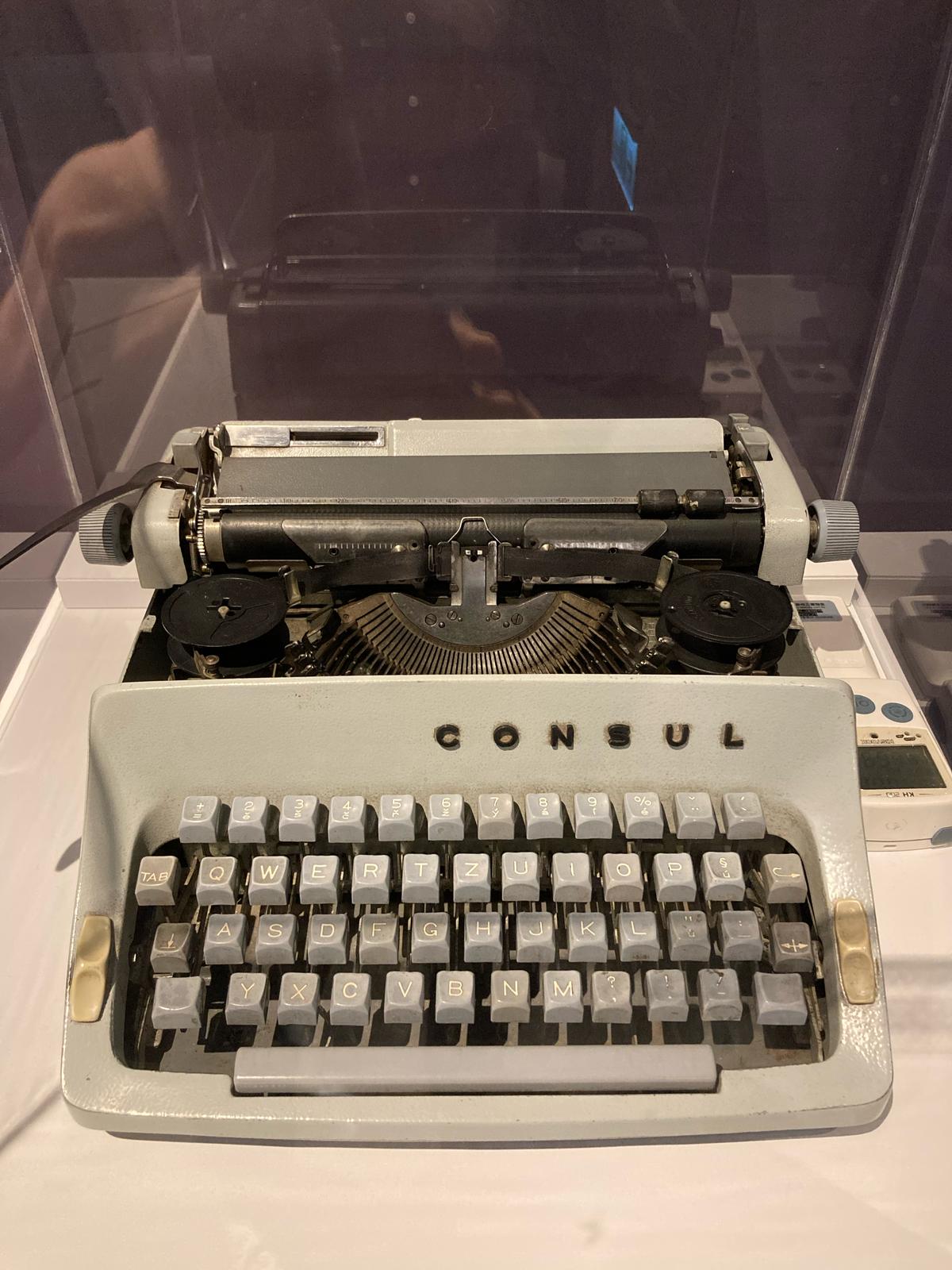
During the 'Normalization' period in Czechoslovakia, writer publications were suppressed. Works could only be circulated as typewritten, bound manuscripts. Therefore, typewriters held significant meaning for the underground literature (Samizdat) of that era, symbolizing resistance against authoritarianism. This is the typewriter used by Bohumil Hrabal for many years.
Courtesy of Polabské Muzeum
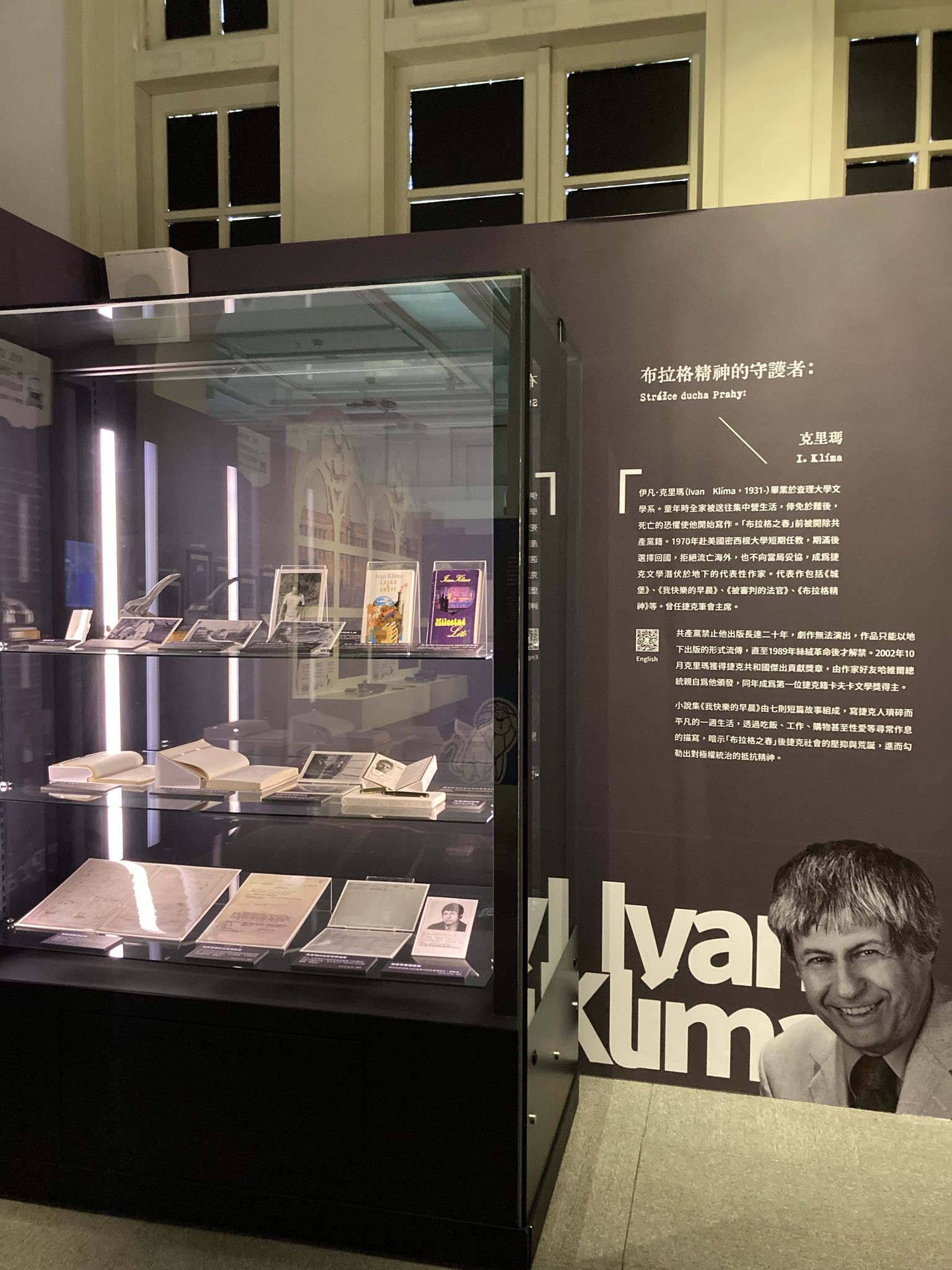
Klíma: Guardian of the "Prague Spirit"
Ivan Klíma (1931- ), a graduate of Czech Charles University (the former Charles-Ferdinand University), spent 1942-1945 as an inmate of Terezín concentration camp, a horrific experience that would inspire and shape his later writings. His membership in the Communist Party of Czechoslovakia (KSČ) was revoked before the 1968 Prague Spring. After completing a short-term teaching contract at the University of Michigan in the United States, rather than joining the ranks of Czech authors in exile, Klíma returned home to Czechoslovakia even though he staunchly refused to self-criticize or tow the official literary line. These choices made Klíma an important figure in Czechoslovakia’s underground samizdat literary movement. His most-celebrated works include Zámek (The Castle), My Merry Mornings: Stories from Prague, Judge on Trial, and The Spirit of Prague and Other Essays. Klíma served as Chairman of Czech PEN from 1989 to 1993.
Klíma, officially banned from publishing and staging his plays in Czechoslovakia for two decades, relied wholly on the underground press to distribute his works until the country’s Velvet Revolution in 1989. Klíma was presented with the Medal for Outstanding Service to the Czech Republic by his old friend and then-President of the Czech Republic Václav Havel in October 2002 and the Franz Kafka Prize later the same year.
My Merry Mornings, a collection of seven short stories, follows the ebb and flow of daily life, from meals and work to shopping and sex, over a one-week period of time. This work opens a window onto the everyday pressures and absurdities of life in Czechoslovakia after the short-lived 1968 Prague Spring and shows the virtue in resisting autocracy.

Tomáš Řízek, born in Prague, the capital of the Czech Republic, is a renowned contemporary Czech painter, illustrator, graphic designer, and publisher, currently residing in Taiwan.
Tomáš illustrated seven short stories from Klima's My merry mornings: stories from Prague reading literature from an illustrator's perspective. My merry mornings: stories from Prague consists of seven short stories from seven consecutive days, filled with the atmosphere of everyday life in Central Europe and its black satirical style.

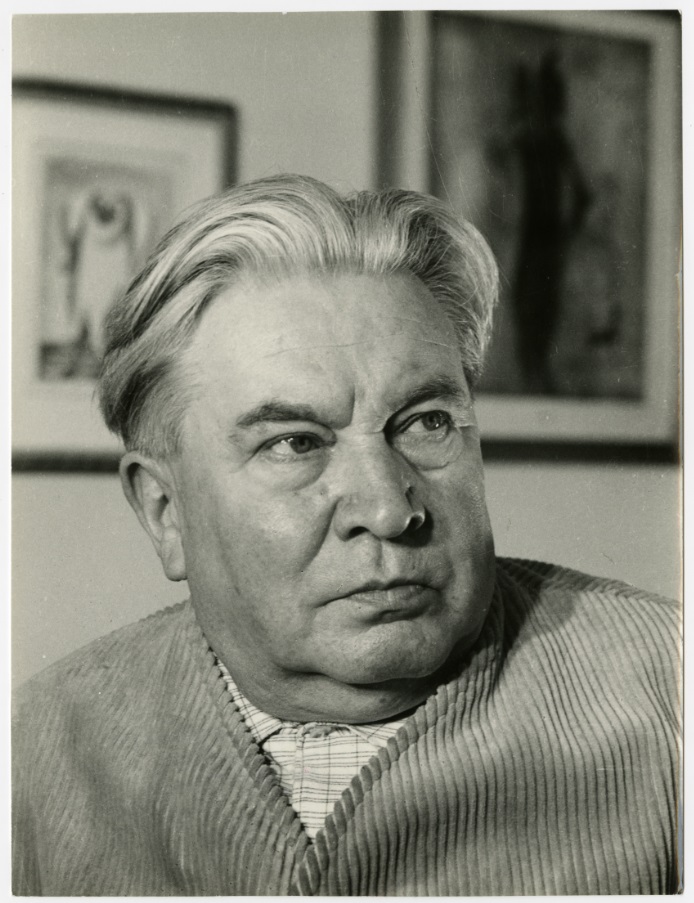
Seifort: Seeing Beauty in All Things
Jaroslav Seifert (1901-1986) is one of Czechia’s most celebrated poets and was the 1984 Nobel Laureate for Literature. Seifert, active in Czech poetry circles since the 1920s, fell under increasing scrutiny in the post-Prague Spring era. His signing of Charter 77, a watershed document lambasting the communist government’s disregard for human rights, led to a complete ban on his works. This ban was partially lifted after his 1984 Nobel Prize, when authorities allowed reprints of previously published collections. Authorities downplayed his Nobel win as much as possible, and Seifert’s funeral in 1986 was closely controlled by State Security (StB) to prevent dissident activity.
Město v Slzách (City in Tears; 1921), Deštník z Picadilly (An Umbrella from Piccadilly; 1979), Morový Sloup (The Plague Column; 1968–1970), and Býti Básníkem (To Be a Poet; 1983) rank among the best-know of his several dozen poetry collections. Všecky Krásy Světa (All the Beauties of the World) is his retrospective collection of essays.

Different version of Morový sloup, collected by the Museum of Czech Literature.
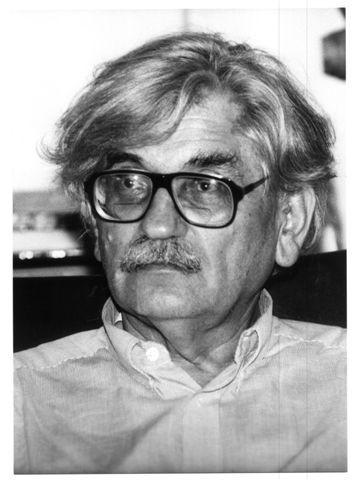
Vaculík: Sharing Literature behind the Padlock
Ludvík Vaculík (1926-2015) was a well-known author of samizdat literature. His authorship of the Two Thousand Words manifesto, published during the Prague Spring, led to his condemnation by Czech communist authorities, revocation of his KSČ party membership, and banning of his works from publication (enforced until the 1989 Velvet Revolution). He founded the influential samizdat literary journal Edice Petlice (The Padlock Editions) in 1973. Vaculík’s many works include Rušný Dům (The Busy House), Sekyra (The Axe), Morčata (The Guinea Pigs), Český Snář (A Czech Dreambook), and Milí Spolužáci (Dear Classmates).

Český snář by Ludvík Vaculík, published by the 68 publisher, collected by the Museum of Czech Literature.

【The Prague Spring】
The Czechoslovak democratization movement known as “Prague Spring” formally began in January 1968 when then-KSČ First Secretary Alexander Dubček announced a series of reforms aimed at achieving "Socialism with a Human Face". This top-down attempt at liberalization, widely welcomed by Czechoslovakian society, was treated by the Soviet Union as a dangerous step toward counterrevolution and a threat to East Bloc unity. Prague Spring came to a precipitous end seven months later after the Soviet Union and three other Warsaw Pact countries invaded Czechoslovakia on August 21st.

【Tales of The Little Mole】
Krteček (The Little Mole), first introduced in 1956, is a popular series of animated cartoons created by animator Zdeněk Miler. Widely beloved today in Czechia and many other countries, The Little Mole‘s loveable characters and lack of narration allow it to translate readily across borders. The series has been syndicated in many countries across Europe and Asia.

